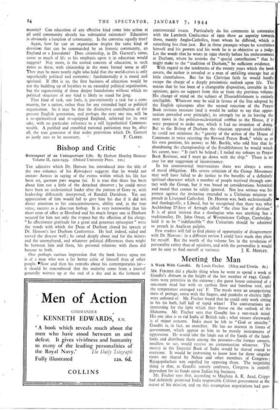Bishop and Critic
Retrospect of an Unimportant Life. By Herbert Hensley Henson. Volume II, 1920-1939. (Oxford University Press. 21s.) THE adjective which Dr. Henson has introduced into the title of the two .volumes of his Retrospect suggests that he would not imitate Aeneas in saying of the events within which his life has been set, quorum pars magna fui. It is true that there has been about him not a little of the detached observer ; he could never have been an ecclesiastical leader after the pattern of Gore or, with leadership differently interpreted, of Randall Davidson. Yet any appreciation of him would fail to give him his due if it did not direct attention to his conscientiousness, ability and, in the true sense, success as a diocesan bishop. It is very noteworthy that his short term of office at Hereford and his much longer one at Durham secured for him not only the respect but the affection of his clergy. " In affectionate gratitude for a great and generous episcopate" were the words with which the Dean of Durham closed his speech at Dr. Henson's last Durham Conference. He had, indeed, ruled and served the diocese well ; he cared deeply about and for the miners and the unemployed, and whatever political differences there might be between him and them, his personal relations with them did honour to both.
One perhaps curious impression that the book leaves upon me is of a man who was a far better critic of himself than of other people. •Now and then his remarks about his contemporaries jar— it should be remembered that the majority come from a journal generally written up at the end of a day and in the ferment of
controversial issues. Particularly do his comments in connexion with the Lambeth Conference of 1920 show an asperity towards those, mainly Anglo-Catholics, from whom he differed, which is something less than just. But in those passages where he scrutinises himself and his powers and his work he is as objective as a judge. Let the words that he wrote in 592o shortly before his enthronement at Durham, where he reviews the " special contribution " that he might make to the " tradition of Durham," be sufficient evidence.
With regard to the tendencies of the twenty years which the book covers, the author is revealed as a man of unfailing courage but of little cheerfulness. But for his Christian faith he would hardly escape the charge of a deeply pessimistic outlook upon life. The notion that he has been of a changeable disposition, unstable in his opinions, gains no support from this or from the previous volume. His change of mind on the subject of Disestablishment is entirely intelligible. Whatever may be said in favour of the line adopted by the English episcopate after the second rejection of the Prayer Book revision measure (and it would be unfair to say that oppor- tunism prevailed over principle), its strength lay in its leaving the next move in the politico-ecclesiastical codtbat to the House, if it were prepared to make one, which it had no intention of doing. But to the Bishop of Durham the situation appeared intolerable ; he could not minimise the " gravity of the action of the House of Commons in twice rejecting the Revised Prayer Book," while as to his own position, his answer to Mr. Buckle, who told him that by abandoning the championship of the Establishment he would wreck his career, was: " It can't be helped ; I nailed my colours to Prayer Book Revision, and I must go down with the ship." There is no case for any suggestion of inconsistency.
In his controversial interventions there was always a sense of moral obligation. His severe criticism of the Group Movement may well have failed to do justice to the benefits of a definitely spiritual character which a number of people received through con- tact with the Group, but it was based on considerations historical and moral that cannot be safely ignored. Not less serious was his protest against the invitation extended to .a Unitarian minister to preach in Liverpool Cathedral. Dr. Henson was, both ecclesiastically and theologically, a Liberal, but he recognised that there was what Archbishop D'Arcy of Armagh called " the clear line of division." It is of great interest that a theologian who was anything but a traditionalist, Dr. John Oman, of Westminster College, Cambridge, held it to be " indefensible " that Unitarians should be admitted to preach in Anglican pulpits.
Few readers will fail to find plenty of opportunity of disagreement with Dr. Henson: in a different review I could have made that plain for myself. But the worth of the volume lies in the revelation of personality rather than of opinions, and with the personality it would not be easy to find oneself at variance. J. K. MOZLEY.






















 Previous page
Previous page